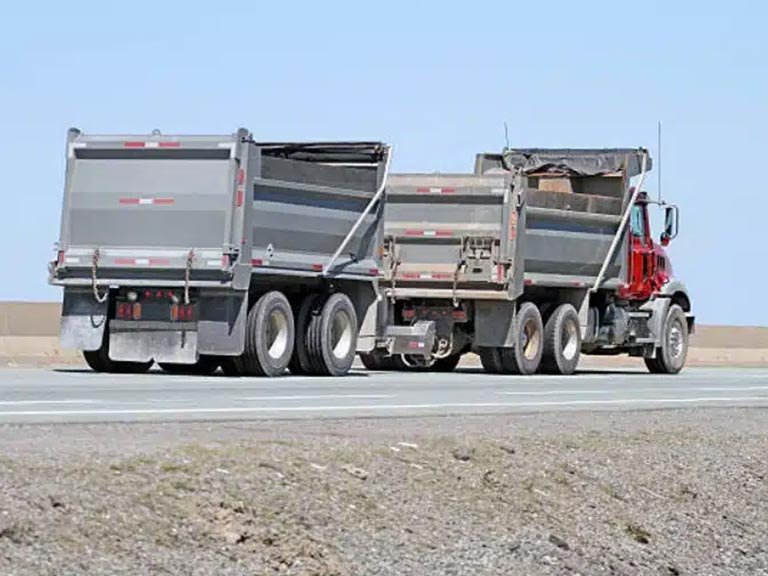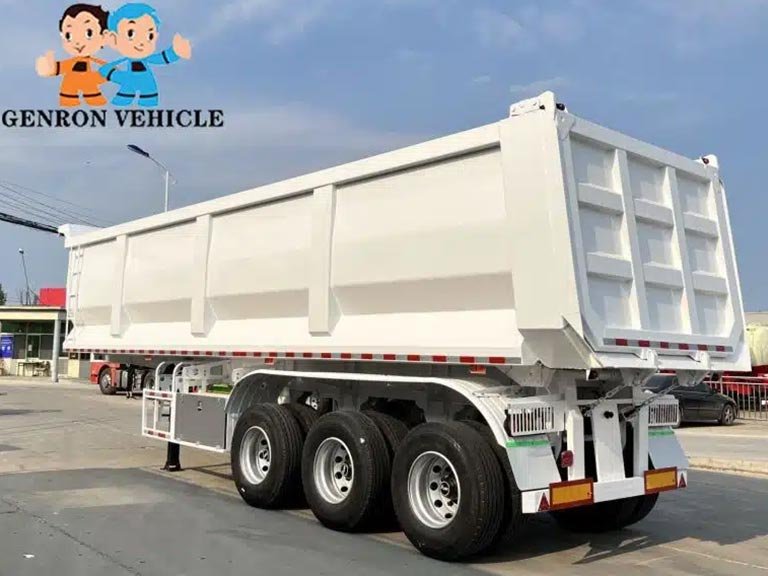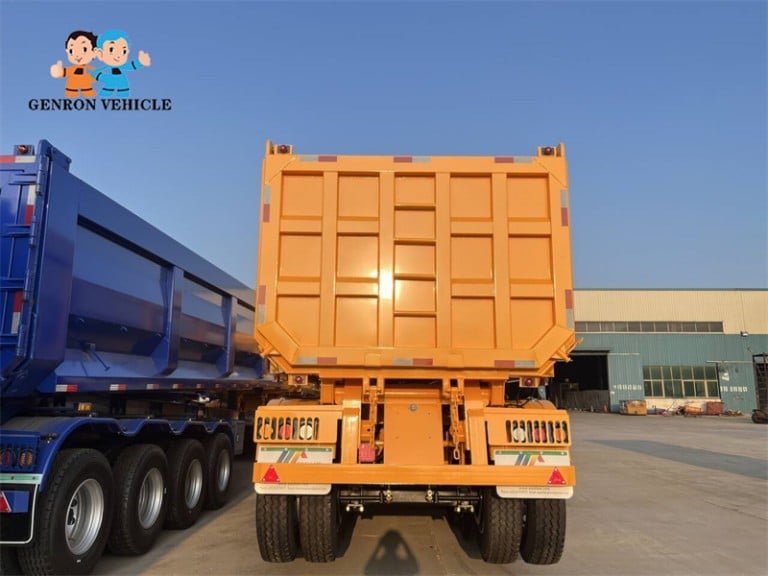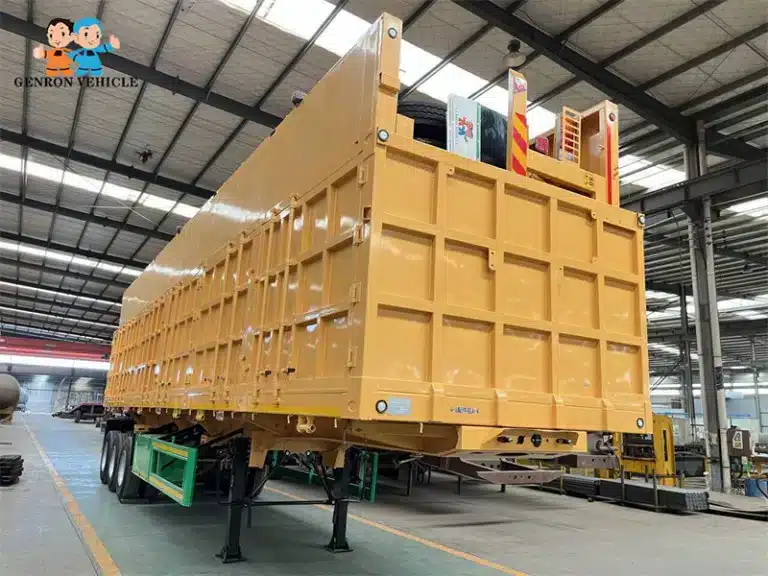In previous articles, we have explored how to choose the right End Dump Trailer. An end dump trailer is a common type of dump truck with features such as a unique design and efficiency. In this post, we will focus on how to choose the right dump truck.
Choosing the right dump trailer is crucial for optimizing your business operations. Genron’s dump trucks are widely used for a variety of material transportation applications due to their ruggedness and durability. If you are thinking of shopping for a suitable dump truck for your business, this guide will provide you with a valuable reference.
When choosing a dump truck, you need to consider several key factors, including size, weight, capacity, metal thickness, type of lift mechanism, design and manufacturing materials. Understanding these factors will help you make an informed decision and ensure the dump truck meets your transportation needs.
Table of Contents
What Is a Dump Trailer and How Does It Work?
A dump trailer is a specialized utility trailer equipped with a hydraulic lifting mechanism. This mechanism tilts the bed, allowing materials to slide out with minimal manual effort. The hydraulic system is the key component that differentiates dump trailers from standard utility trailers.
Dump trailers offer a practical solution for industries that frequently deal with heavy or loose materials. These trailers are designed to simplify the process of transporting and unloading materials. This makes them an essential tool for various sectors.
- The hydraulic lifting mechanism enables efficient unloading.
- Dump trailers are designed for the safe transportation of heavy or loose materials.
- They provide a cost-effective alternative to larger commercial vehicles like dump trucks.
Benefits of Owning a Dump Trailer
Owning a dump trailer offers several benefits. These include reduced labor costs, safer unloading processes, and the flexibility to tackle multiple tasks. Professionals in construction, landscaping, and agriculture can complete projects faster and maintain reliability.
- Reduced labor requirements and improved job site efficiency.
- Enhanced operational flexibility and the ability to take on a wider range of projects.
- A substantial return on investment through reduced operational costs.
Begin with a bespoke semi-trailer designed for your exact needs. Whether it’s heavy-duty hauling or specialized cargo, we’ve got the perfect solution to keep you moving forward.
What should I consider when choosing a dump truck?
When choosing the right dump trailer, you should primarily consider the following factors.
Size
The first thing you should consider when choosing a dump trailer is the dump trailer dimensions. Depending on different needs, dump trailers have different sizes, which correspond to different load capacities as well as applicable environments.
If you want to carry out a large number of goods transportation at one time, and at the same time, the road conditions are good. Then the bigger the dump truck the better, because it can transport a large amount of goods at once. If you mainly transport on the narrow road, then you may need to choose a smaller size of dump trailer.
The height of the cargo box of the dump truck is also an important consideration. The standard cargo box height for dump trucks is 24 inches. If you want a taller cargo box, then you need to customize the design by providing the requirements to the trailer manufacturer. You can also purchase metal sidewall extension parts for heightening at a later stage as per the requirement.
In contrast, perhaps the second approach is a bit more flexible. This is because it will be of great use for bulk cargo transportation, whereas it will not be as convenient for transportation of large items such as equipment.
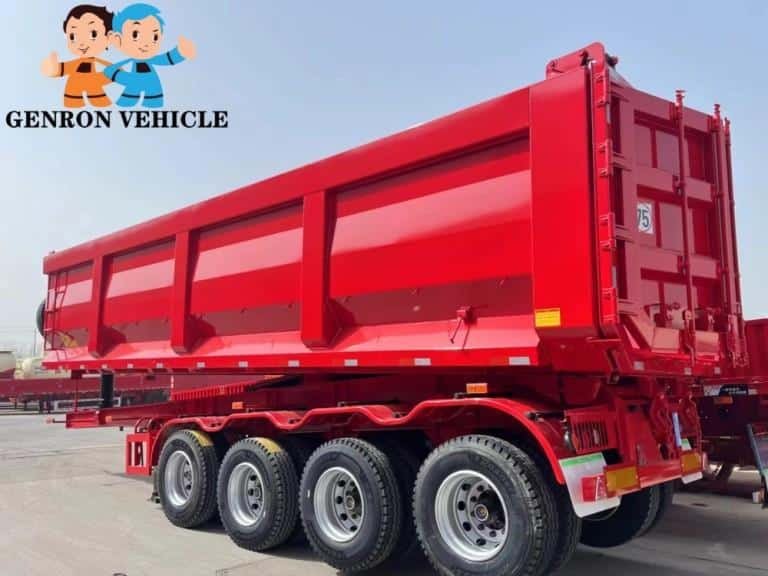
Weight and Capacity
It is equally important to know the weight and capacity as compared to the size of the dump truck. Each type of dump truck trailer has its specific carrying capacity. So when it comes to choosing the right trailer, it comes down to making an informed decision based on your own load capacity needs.
For example, Genron’s rear dump trailers have a load capacity of between 50-100 tons. Upon request, we can also cater for customized tippers over 100 tons.
Also, a factor to consider is whether the maximum towing capacity of the tractor head is greater than the total weight of the dump truck. Traction force is usually related to the make and model, engine, transmission, and other factors, and you need to make sure that the weight of the trailer matches it.
Therefore, when selecting a trailer, get a detailed understanding of the weight and capacity requirements of the trailer and choose the type of dump truck that matches.
Materials and finishes
Dump trucks are usually made of steel or aluminum, and each material is characterized by its own features. Genron’s steel rear dump trailers are rugged and durable, and are particularly well suited for heavy hauling. However, steel is extremely susceptible to rust and requires regular maintenance to extend its life.
The good news, however, is that we also offer a galvanizing service to effectively extend the life of your dump truck. If you need a lighter and more rust-resistant type of trailer, then an aluminum trailer is also a good option. These trailers also offer better fuel efficiency.
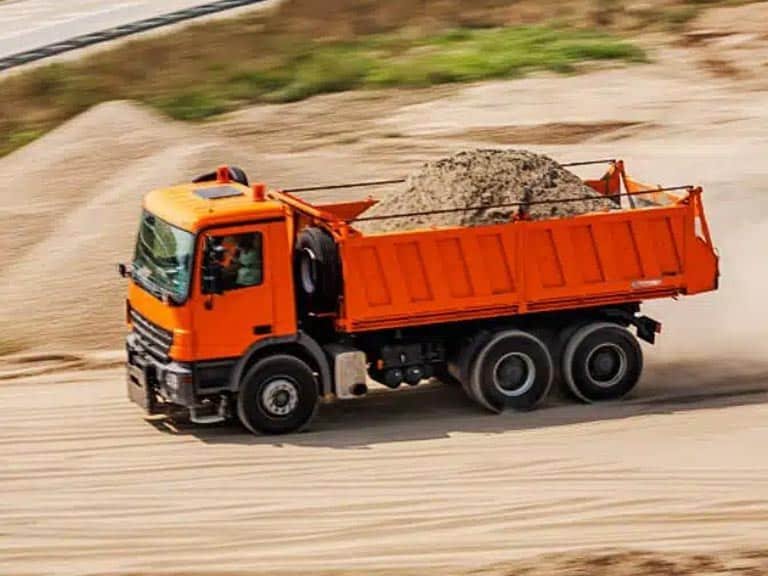
Metal Thickness
The thickness of the trailer’s cabin is also important. The thickness of trailers manufactured by each company varies. Since the trailer compartments carry most of the weight of the cargo. Therefore, if you are transporting heavy cargo, then choose a thicker compartment for transportation.
Therefore, before choosing the right trailer, base your choice on the material you will be transporting in the future.
Lifting mechanism
The lift mechanism is also a crucial factor when choosing the right dump truck. It determines the efficiency, stability, and carrying capacity of the trailer for unloading materials. There are several types of Genron lift mechanisms depending on the needs. Each of these types is suitable for different working environments and load requirements.
-
Single Plunger Lift: The single plunger lift (or telescopic lift) is the most economical choice for a wide range of light commercial loads. It has a simple design and is centered on the frame of the dump truck, and is low maintenance. This lift mechanism is especially suited for smaller loads and high-frequency use scenarios. It effectively avoids frame twisting or fatigue due to overloading.
-
Scissor Lift: Scissor lifts offer great stability and lifting capacity and are ideal for transporting heavy or uneven loads. This type of lift lifts the side of the vehicle with a single cylinder for efficient dumping of the load. It is ideal for environments that require greater stress or heavier loads. Compared to other types, scissor lifts also effectively reduce the pressure exerted on the trailer frame during dumping, providing the advantage of greater stability.
-
Dual Plunger Lift: As the name suggests, a “dual plunger lift” consists of two hydraulic cylinders. It provides more power for lifting operations. However, this type of lifting equipment requires higher maintenance and may not be as stable and reliable as a single plunger or scissor lift. A common problem is that the lifting cylinders are not synchronized, causing the truck to tilt and thus causing damage to the shelves.
Design
What do you need to transport? What additional facilities are needed? These are also things you need to consider. Luckily, however, Genron has compiled a detailed list to help you better answer this question.
- Number of axles: Commonly, there are multiple axle designs as well as single axle designs. For larger cargo transportation needs, then go for a multi-axis design, which is capable of handling larger loads. For smaller loads, a single axle design may be more suitable.
- Ramps: To be able to load more easily. You can choose this design, which can be mounted on the rear fender or under the trailer compartment.
- Rear or side door: dump trucks are equipped with a rear or side door. The side door is a more convenient option for loading and unloading items. And the rear door fits the side door serves the same purpose. But the difference is that the rear door supports a variety of options. Common options are single doors, barn doors, mesh doors, hanger doors, and truck compartment doors.
- Brakes: Your trailer must be equipped with high-quality brakes. Choosing the right brakes can ensure safety.
Budget
You must consider your budget when choosing the right trailer. This is because the price of dump trucks can vary widely depending on factors such as size, capacity, materials, and features.
Although investing in a cheaper trailer can be affordable in the short term. But in the long run, you need to invest in durable, high-quality types of trailers. This is what will always bring you long-term returns.
This is because the expensive trailers will bring you financial benefits by effectively reducing all the maintenance costs at a later stage. At the same time, it provides you with a reliable transportation performance.
Therefore, take time to compare. Choose the best type of trailer possible within the right budget.
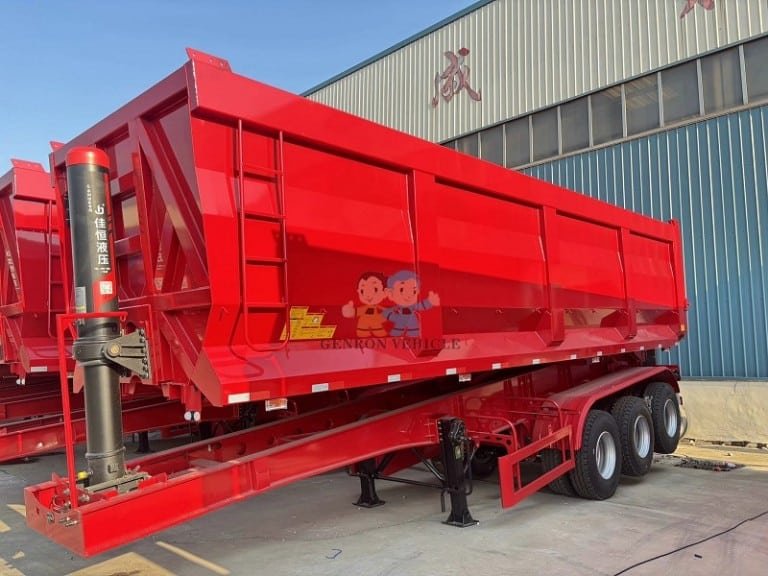
Types of Dump Trailers for Different Needs
There are various types of dump trailers available to meet different tasks and industry requirements. Understanding these differences is key to selecting the right trailer for your specific needs.
- Small Utility Dump Trailers: Typically measuring 5×10 feet, they are ideal for lighter loads up to 5,000 lbs. They are best suited for landscaping tasks, small construction jobs, and residential use. Their advantages include being lightweight, easy to tow, and affordable.
- Mid-Size Dump Trailers: These trailers, commonly 6×12 or 7×14 feet, have capacities ranging from 7,000 to 14,000 lbs. They are perfect for general contractors and medium-sized hauling jobs, offering a balance between usability and load capacity.
- Heavy-Duty Dump Trailers: These trailers can be up to 8×20 feet with capacities exceeding 20,000 lbs. They are designed for large-scale construction, demolition, or farming tasks that require heavy hauls, offering maximum durability and capacity.
- Specialty Dump Trailers: These trailers include utility trailers with dump features and roll-off dump trailers. They are particularly useful for businesses focused on debris management and waste collection.
By understanding the different types of dump trailers and their applications, you can make an informed decision. This can meet your specific needs. Whether it is for landscaping, construction, or other industries.
Choose a customized trailer from Genron!
Choosing the right trailer is crucial for your transportation business. Genron, as a professional trailer manufacturer, we can provide you with the most suitable type of trailer within your limited budget.
In addition, our dump trucks are rugged and durable. They can meet the needs of transportation in all kinds of harsh conditions. For different applications, we can also provide customization to ensure that your transportation needs are met.
If you need headers, we can also provide them. As an authorized HOWO dealer, we can provide you with affordable HOWO headers. Providing you with a complete material transportation solution.
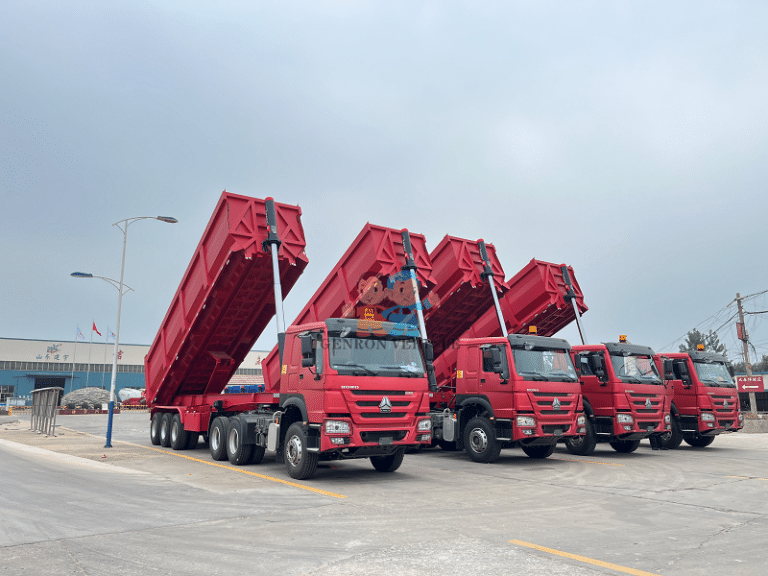
FAQ
What size dump trailer is ideal for landscaping projects?
For landscaping projects, a mid-size dump trailer with a capacity ranging from 7 to 14 cubic yards is often suitable. It can handle substantial loads of soil, gravel, or debris without being too cumbersome for smaller job sites.
How do I determine the weight capacity of a dump trailer?
To determine the weight capacity of a dump trailer, check the manufacturer’s specifications. Typically includes the Gross Vehicle Weight Rating (GVWR) and the payload capacity. Ensure the trailer’s capacity aligns with your needs, considering the density of materials you’ll be hauling.
What are the benefits of a hydraulic vs. manual lifting mechanism?
Hydraulic lifting mechanisms offer easier and faster unloading, reduced labor. It can handle heavier loads compared to manual systems. However, they require more maintenance and are generally more expensive.
Can I tow a dump trailer with any vehicle?
No, towing a dump trailer requires a vehicle with sufficient towing capacity. Check your vehicle’s towing capacity and ensure it’s compatible with the trailer’s weight and size. Additionally, consider the type of hitch and wiring needed.
What maintenance is required for a dump trailer?
Regular maintenance of dump trailers includes checking and maintaining tires, brakes, and suspension, as well as lubricating moving parts. In addition, if equipped with a hydraulic system, it also needs to be checked regularly. Regularly cleaning the trailer and applying a rust inhibitor can also extend its lifespan.
Are there any specialty dump trailers designed for specific tasks?
Yes, there are dump trailers designed for specific tasks, such as equipment hauling, snow removal, or carrying heavy construction materials. These trailers often feature customized designs, such as reinforced beds or specialized tie-downs.

